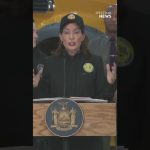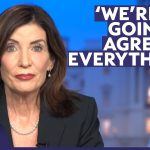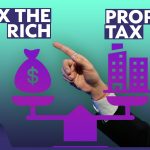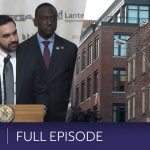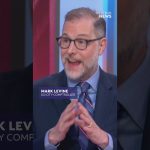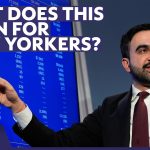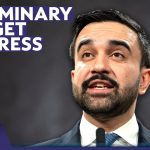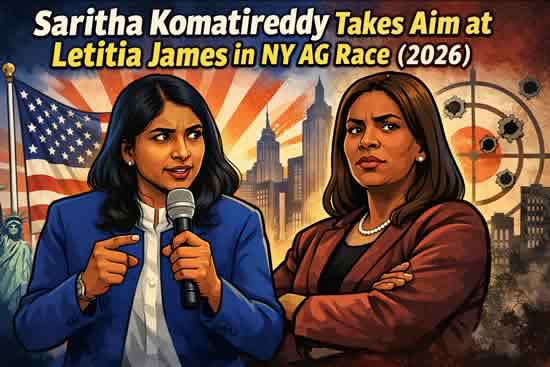As Brooklyn approaches the November 2025 borough president election, voters face a clear yet nuanced choice between two candidates who represent contrasting visions for the future of the borough. On the Democratic side stands Antonio Reynoso, the incumbent Borough President seeking a second term ( I ran on the promise of creating ‘a Brooklyn for all’ and I remain committed to that vision. That means delivering affordable housing, improving health outcomes, fighting food insecurity, and expanding alternatives to incarceration. I know many feel disillusioned with politics, but I want them to know I am serious about delivering real change and building a more just, livable Brooklyn.” ).
On the Republican ticket is Janine Acquafredda, a real estate professional and community advocate offering a more conservative alternative. On her sire we can see : Public Safety , Housing Affordability Small Business and Animal Welfare
Both candidates speak to the heart of Brooklyn’s evolving identity, yet their policies, priorities, and leadership styles diverge significantly.
Antonio Reynoso: Progressive Planning and Public Equity
Antonio Reynoso has built his political career on the pillars of equity, public health, and sustainable development. Elected in 2021, Reynoso brought with him a history of advocacy from his time on the New York City Council, where he represented North Brooklyn neighborhoods.
His first term as borough president has centered around groundbreaking maternal health programs, including the creation of New York’s first Perinatal Mental Health Certificate and multi-million-dollar investments in neonatal infrastructure. Beyond healthcare, Reynoso is a vocal proponent of comprehensive city planning, pushing for a 10-year strategic development plan guided by an “Access to Opportunity Index” to tackle historic underinvestment in marginalized neighborhoods.
Reynoso’s platform also includes bold stances on affordable housing, where he advocates for upzoning, ending single-family zoning, and opposing displacement-based development. He champions environmental justice, expanding EV infrastructure and redesigning dangerous corridors under Vision Zero. His deep alliances with labor unions, progressive groups, and immigrant advocates position him as a candidate of broad-based public investment.
Janine Acquafredda: Local Priorities and Conservative Realignment
Janine Acquafredda brings a markedly different perspective. A lifelong Brooklynite who rose from public housing to success in real estate, she frames her candidacy as a return to “commonsense leadership.” Her campaign emphasizes public safety, driver rights, housing access, and small business support.
Unlike Reynoso’s expansive, equity-driven urban planning, Acquafredda speaks to residents frustrated by top-down changes like Citi Bike expansion or restrictive zoning. She argues that drivers and homeowners are underrepresented and promises to restore balance by streamlining permitting, reducing bureaucracy, and advocating for local infrastructure without sacrificing parking or traffic flow.
Though her platform lacks the extensive policy detail of Reynoso’s, Acquafredda appeals to voters disillusioned with progressive governance, focusing on crime prevention, community cleanliness, and housing access—especially for first-time buyers. Her campaign is modestly funded and grassroots-oriented, relying more on direct engagement than institutional endorsements.
Similarities and Shared Ground
Despite ideological differences, both candidates claim deep ties to Brooklyn and express a commitment to the borough’s well-being. Each acknowledges the crisis of housing affordability and the need for investment in community infrastructure. Both oppose corporate-driven displacement and promote local ownership, though their solutions differ sharply.
Another shared value is neighborhood identity—both have expressed concern about the erasure of local character, whether through overdevelopment or external corporate influence. In this sense, both seek a more balanced Brooklyn, though through divergent lenses.
Conclusion: A Defining Choice for Brooklyn’s Future
The 2025 Brooklyn Borough President race is not just a contest of resumes; it’s a reflection of competing ideologies in an increasingly polarized city. Antonio Reynoso represents continuity, vision, and a technocratic approach to social equity. Janine Acquafredda offers a recalibration toward local control, personal responsibility, and conservative urbanism.
Brooklyn voters must weigh not only policies but also priorities: Will they reaffirm a progressive vision of systemic change, or opt for a more neighborhood-centered, cautionary direction? The outcome will influence not only the borough’s development but the broader direction of urban governance in New York City.
Antonio Reynoso vs. Janine Acquafredda: Equity, Equality, and the Future of Brooklyn
As Brooklyn heads toward the November 2025 borough president election, two sharply contrasting candidates are offering visions that reflect not just different policies, but different values. Antonio Reynoso, the Democratic incumbent, represents a progressive, equity-driven agenda that focuses on immigrants, climate action, and social justice. His opponent, Janine Acquafredda, running on the Republican and Conservative lines, presents herself as a voice for native-born Americans, neighborhood security, and traditional equality under the law.
Antonio Reynoso: Equity, Inclusion, and Environmental Justice
Reynoso’s approach is rooted in equity, meaning he seeks to give more attention and resources to groups historically excluded—immigrants, working-class families, and marginalized communities.
- For immigrants, Reynoso has supported funding for legal aid, asylum navigation centers, and sanctuary policies to protect undocumented residents from federal enforcement.
- On climate, Reynoso pushes for sustainable transit, EV chargers, and infrastructure equity, especially in underserved areas hit hardest by pollution and heat.
- His belief in equity over equality means he supports redistributing city planning efforts to uplift the most vulnerable—not treating every area identically, but compensating for historic disadvantage.
To Reynoso, fairness means recognizing structural injustice and correcting it with targeted policy.
Janine Acquafredda: Americans First, Neighborhood Focus, and Classic Equality
Janine Acquafredda presents a more conservative interpretation of fairness—“equality” as equal treatment under the law, rather than redistribution.
- She emphasizes prioritizing American citizens, particularly longtime Brooklynites who she says feel overlooked in favor of newer populations or out-of-borough agendas.
- On immigration, she does not endorse sanctuary policies or expanded services for undocumented people, favoring a more regulated, legal-immigration-first approach.
- She is skeptical of aggressive climate mandates, especially where they interfere with car owners or local property rights (e.g., Citi Bike expansions or zoning changes).
- For Acquafredda, equality means ensuring everyone gets the same treatment, without “special programs” that advantage one group over another.
She frames her platform as protecting everyday Americans, small homeowners, and working families who feel alienated by elite progressive policies.
Key Difference: Equity vs. Equality
| Concept | Antonio Reynoso (D) | Janine Acquafredda (R) |
|---|---|---|
| Immigration | Pro-immigrant services & sanctuary | Legal immigration only, citizens first |
| Climate | Supports green transit, sustainability | Opposes forced green initiatives |
| Fairness model | Equity—unequal aid to fix injustice | Equality—same treatment for all |
| Focus | Marginalized & low-income groups | Citizens, drivers, small property owners |
Conclusion
Brooklyn voters face a symbolic and practical choice. Antonio Reynoso seeks to build a borough that corrects past injustice through targeted policy, inclusion, and environmental action. Janine Acquafredda calls for a return to equality rooted in national identity, local stability, and individual fairness without special categories.
Both speak for parts of Brooklyn’s soul—one reaching outward to include the vulnerable, the other protecting the familiar and forgotten. The election will reveal which vision the borough wants to define its future.
Antonio Reynoso (Democrat)
Tax Philosophy: Progressive & Redistributive
- Supports higher taxes on the wealthy and corporations to fund public services like healthcare, housing, education, and infrastructure.
- Advocates for equity-based spending, meaning more resources should be directed toward historically underfunded communities, even if it requires increased taxation or reallocation.
- Backed by progressive groups who call for ending tax breaks for luxury developers and large landlords.
- Has criticized regressive property tax policies that disproportionately affect lower-income homeowners.
🔹 Inferred tax stance: Open to increasing or restructuring taxes on high-income earners and big real estate to support social programs.
Janine Acquafredda (Republican)
Tax Philosophy: Lower and Simpler Taxes
- Opposes “excessive” city spending and over-taxation of middle-class homeowners and small businesses.
- Frequently speaks about the burden of property taxes and government fees on Brooklyn families and drivers.
- Calls for cutting wasteful spending instead of raising taxes—especially on people who live, work, or invest in Brooklyn.
- Frames her fiscal approach as “pro-business” and “pro-homeowner,” aiming to keep taxes low to support working-class residents.
Inferred tax stance: Favors tax relief for middle-class families, opposes tax hikes, and wants leaner government.
Summary Comparison
| Area | Antonio Reynoso (D) | Janine Acquafredda (R) |
|---|---|---|
| Tax philosophy | Progressive: tax the rich & reinvest | Conservative: reduce tax burden |
| Property taxes | Reform to protect low-income owners | Lower taxes for homeowners |
| Business taxes | Increase corporate responsibility | Support small business via tax relief |
| Spending model | Expand public investment | Cut spending, oppose “waste” |
Here’s a breakdown of Brooklyn’s current tax structure (as of 2025) and how the policies of Antonio Reynoso and Janine Acquafredda could practically affect property owners, renters, and small businesses — even though Borough Presidents don’t set tax rates directly.
🏠 Property Taxes in Brooklyn (2025 Overview)
- Brooklyn residents pay New York City property tax, calculated based on assessed value and property class.
- NYC’s property tax system is widely criticized as outdated and unfair, often:
- Under-taxing luxury co-ops and condos
- Overburdening small homeowners in working-class areas
- Effective tax rate on Class 1 (1–3 family homes): ~0.88%
- But assessments are capped, creating wide disparities.
How Antonio Reynoso’s Policies Might Affect You
For Property Owners:
- Reynoso supports property tax reform, especially to make the system more equitable.
- He wants to eliminate unfair breaks for luxury buildings.
- Could advocate for higher taxes on wealthier homeowners or speculators, while protecting working-class owners.
- May support state-level efforts to lift assessment caps on high-value properties.
For Renters:
- Supports building more affordable and social housing, using tax tools like inclusionary zoning.
- May oppose property tax incentives for luxury developers unless affordability is guaranteed.
For Small Businesses:
- Prioritizes labor equity and union wages over tax relief.
- Might support commercial rent stabilization or incentives for minority- and women-owned businesses (MWBEs), funded via higher commercial taxes or fees on chain stores.
🔷 Bottom Line: If you’re a renter or a working-class homeowner, Reynoso’s policies may favor you. But if you own high-value real estate or run a large business, expect more regulation and potential cost increases.
How Janine Acquafredda’s Policies Might Affect You
For Property Owners:
- Would likely oppose property tax increases, particularly on middle-income homeowners.
- Supports simplifying tax code and keeping assessment increases in check.
For Renters:
- Less focus on renter protections; prioritizes expanding homeownership and making it easier to purchase property.
- Likely to oppose mandates on developers tied to rent caps or affordable housing quotas.
🏢 For Small Businesses:
- Strongly favors lowering commercial taxes and permit fees.
- Would push to cut “red tape” and make it easier to open or expand businesses without added fiscal burden.
Bottom Line: If you’re a homeowner, landlord, or small business owner, Acquafredda’s proposals may save you money. However, renters, transit users, and public service advocates may see fewer protections or investments under her approach.
Summary Comparison Table
| Group | Antonio Reynoso (D) | Janine Acquafredda (R) |
|---|---|---|
| Small Homeowners | Supports progressive reform, may tax high-value properties | Opposes property tax increases for all |
| Renters | Supports protections, affordable housing incentives | Focuses on homeownership instead |
| Small Businesses | MWBE and union support, less tax relief | Tax cuts, permit easing, pro-entrepreneur |
| Developers | Higher taxes unless affordable housing is built | Fewer restrictions, lower tax burdens |
Disclosure Statement
The information presented in this document is based on publicly available sources as of June 2025. These sources include official campaign websites, government platforms, nonpartisan election databases, reputable news outlets, and public financial filings. Specifically, sources include:
- Candidate campaign websites (e.g., janineforbrooklyn.com, reynosoforbrooklyn.com)
- New York City Campaign Finance Board (nyccfb.info)
- Local and national news media (e.g., The City, Brooklyn Paper, AP News)
- Governmental sites (e.g., brooklynbp.nyc.gov, nyc.gov)
- Public debate transcripts and interviews
- Ballotpedia and official voter guides
Every effort has been made to ensure the accuracy of the information. However, candidates’ platforms and positions may evolve throughout the campaign.

